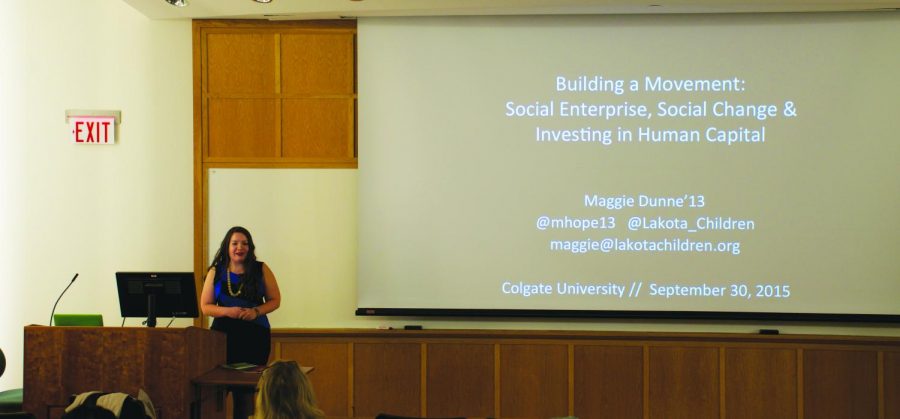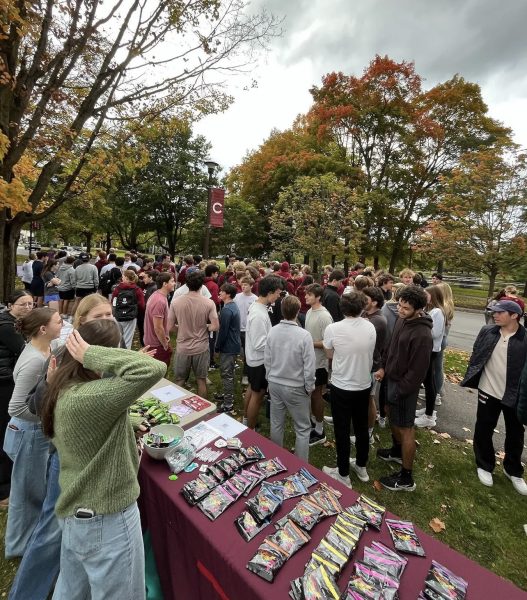Alumna Maggie Dunne ’13 Discusses Founding Lakota Children’s Enrichment, Inc.
On Wednesday, September 30, President and Founder of Lakota Children’s Enrichment, Inc. (LCE) and alumna Maggie Dunne ’13 spoke at a lecture titled “Building a Movement: Social Entrepreneurship, Social Change, and Investing in Human Capital” in Persson Auditorium. Dunne shared her story of founding LCE, discussing the challenges she faced and lessons she learned during her years of dedication to the organization.
Dunne started off by introducing the Pine Ridge Reservation in South Dakota, which was home to the Oglala Dakota Nation, and explaining why she established LCE. Dunne had ignored the Native American nations until her trip to the Pine Ridge Reservation, which is listed by the United Nations as one of the most marginalized indigenous communities in the world. Observing how the community had no access to basic needs, books or resources, and later discovering that South Dakota was the most economically depressed part of the country, Dunne started to write articles in local newspapers to educate others on the issue. She contacted teachers in South Dakota about specific items they needed and volunteered to ship them to the reservation. However, Dunne did not think about founding LCE until she was contacted by a local lawyer, who suggested that she establish a non-profit organization.
LCE transformed from an entity that supplied books for the reservation to an organization that provides Lakota youth with opportunities for expressing their own voice through art, sports, leadership and mentorship training. The organization has hosted writing contests as well as a summer math and science camp with the Rose-Hulman Institute of Technology to allow children to show their abilities and express their voices.
In her discussion, Dunne talked about the challenges she faced during her years of working at LCE. She also addressed the issue of how the media should appropriately treat images when depicting people who generally need help.
“A person may not know their photos are being used. She might speak a different language, may not have access to [the] Internet and may not know that her image is used to engage [an] audience,” Dunne said
She noted how the media should only use these images in a respectful way, with the approval of the person photographed.
Dunne noted the importance of lessons students learn at Colgate that empower them to master valuable skills such as video editing, graphic designs, budget balancing and thinking outside the box. Dunne also emphasized the significance of being a good writer.
“The ability to synthesize either a situation or information [when writing] is important. People should be able to cut [their writing] down into a short piece of information so that the public can read and also understand the whole point,” Dunne said.
Dunne also provided advice for students, encouraging young people in particular to step out of their comfort zones, take risks within their abilities and reach out to alumni for help when they have an idea that they are passionate about.
“You never know [to] what capacity you [can] get involved. Youth is an asset. People love young people who want to make a difference in the world. Do not let anyone tell you that you can’t do something,” she said.
Dunne concluded the lecture by quoting part of the speech that Robert F. Kennedy gave at University of Notre Dame in 1968, relating it to her work.
“There are children in the United States with bloated bellies and sores of disease on their bodies. There are children in the United States who eat so little that they fall asleep in school and do not learn. We must act, and we must act now. These are our responsibilities. If we cannot meet them, we must ask ourselves what kind of a country we really are; we must ask ourselves what we really stand for. We must act – and we must act now,” Dunne quoted.






